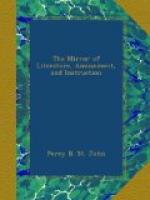“No man of his day possessed so much tact in appropriating and adorning the wit of others. He pillaged his predecessors of their ideas, with as much skill and effrontery as he did his contemporaries of their money. It was his ambition to appear indolent; but he was, in fact, particularly, though not regularly laborious. The most striking parts of his best speeches were written and rewritten, on separate slips of paper, and, in many cases, laid by for years, before they were spoken. He not only elaborately polished his good ideas, but, when they were finished, waited patiently, until an opportunity occurred of uttering them with the best effect. Moore states, that the only time he could have had for the pre-arrangement of his conceptions, must have been during the many hours of the day which he passed in bed; when, frequently, while the world gave him credit for being asleep, he was employed in laying the frame-work of his wit and eloquence for the evening.
“Like that of his great political rival, Pitt, his eloquence required the stimulus of the bottle. Port was his favourite wine; it quickened, he said, the circulation and the fancy together; adding, that he seldom spoke to his satisfaction until after he had taken a couple of bottles. Arthur O’Leary used to remark, that, like a porter, he never was steady unless he had a load on his head.
“He also needed the excitement of wine when engaged in composition. ‘If an idea be reluctant,’ he would sometimes say, ’a glass of port ripens it, and it bursts forth; if it come freely, a glass of port is a glorious reward for it.’ He usually wrote at night, with several candles burning around him.
“The most serious appointments were, to him, matters of no importance. After promising to attend the funeral of his friend Richardson, he arrived at the church after the conclusion of the burial service; which, however, to their mutual disgrace, he prevailed on the clergyman to repeat. But, notwithstanding his liability to the charge of desecration, even in more than one instance, he professed, and it is but charitable to presume that he felt, in his better moments, a deep sense of the worth of piety. He had ever considered, he said, a deliberate disposition to make proselytes in infidelity, as an unaccountable depravity, a brutal outrage, the motive for which he had never been able to trace or conceive.
“Sheridan enjoyed a distinguished reputation for colloquial wit. From among the best of the occasional dicta, &c. attributed to him, the following are selected:—
“An elderly maiden lady, an inmate of a country house, at which Sheridan was passing a few days, expressed an inclination to take a stroll with him, but he excused himself, on account of the badness of the weather. Shortly afterwards, she met him sneaking out alone.
‘So, Mr. Sheridan,’ said she, ‘it has cleared up.’ ‘Yes, madam,’ was the reply; ’it certainly has cleared up enough for one, but not enough for two;’ and off he went.




